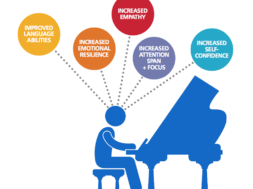Benefits of Playing a Musical Instrument for Adults
It appears that adults who wish to play an instrument become interested because they never had the opportunity as a child to do so. Adulthood allows freedom to pursue and experiment with various hobbies and interests. Learning to play an instrument may also be recommended by medical staff, friends, and family members.
Human beings are living longer and are afforded the luxury of time to enjoy more hobbies and leisure time interests.
Benefits of Playing:
- Playing an instrument is mentally advantageous for learning, memory, and focusing.
- Music helps relieve mental stress.
- Relaxes muscles
- It emotionally nurtures creativity and imagination.
- Spiritually, music rewards you with freedom, comfort, and a feeling of oneness with the universe.
Learning to play a musical instrument gives many of us a leisure pleasure, the wherewithal to share our talents with others, and it widens our social circle. There is no reason to experience loneliness as music lightens our soul and welcomes friendships.
There are four categories from which to choose. Select from percussion, string, brass, and woodwind.
- Percussion refers to instruments that must be struck with fingers, hand, or an object. Drums, piano, and tambourine are three examples.
- String instruments usually have metal strings and produce sound with fingers or a pick. The guitar and banjo are two examples.
- Brass instruments are made from brass and have a brass mouthpiece. Two examples wold be the trumpet and the saxophone.
- The woodwind instruments are made from metal. The mouthpiece is made from wood and is called the reed. Clarinet and flute would be included in this group.
How to Select:
There are many different instruments within each category. If you are not interested in American or European musical instruments, review world-wide instruments. They will have different names but they will fit within the four categories or families.
- Select the instrument that represent your style of music.
- The instrument should fit into your lifestyle.
- Space, storage, and maintenance needs to be considered.
- Sample different instruments before purchasing.
- Talk to others about their musical experiences.
- Borrow from a friend or family member before buying.
- Rent before buying.
- Consider practice time schedule.
- Is there a good teacher available?
Personal example:
I am not a musician but I do respect people who have mastered playing one. The main importance of your selection is that you love it and you enjoy it.
I selected the piano as a child
I tried a flute which my friend liked and discovered I did not have the lungs for it.
As an adult I sampled the guitar, but the strings cut my fingers
Later I enjoyed the drums because I wanted to learn different rhythms.





